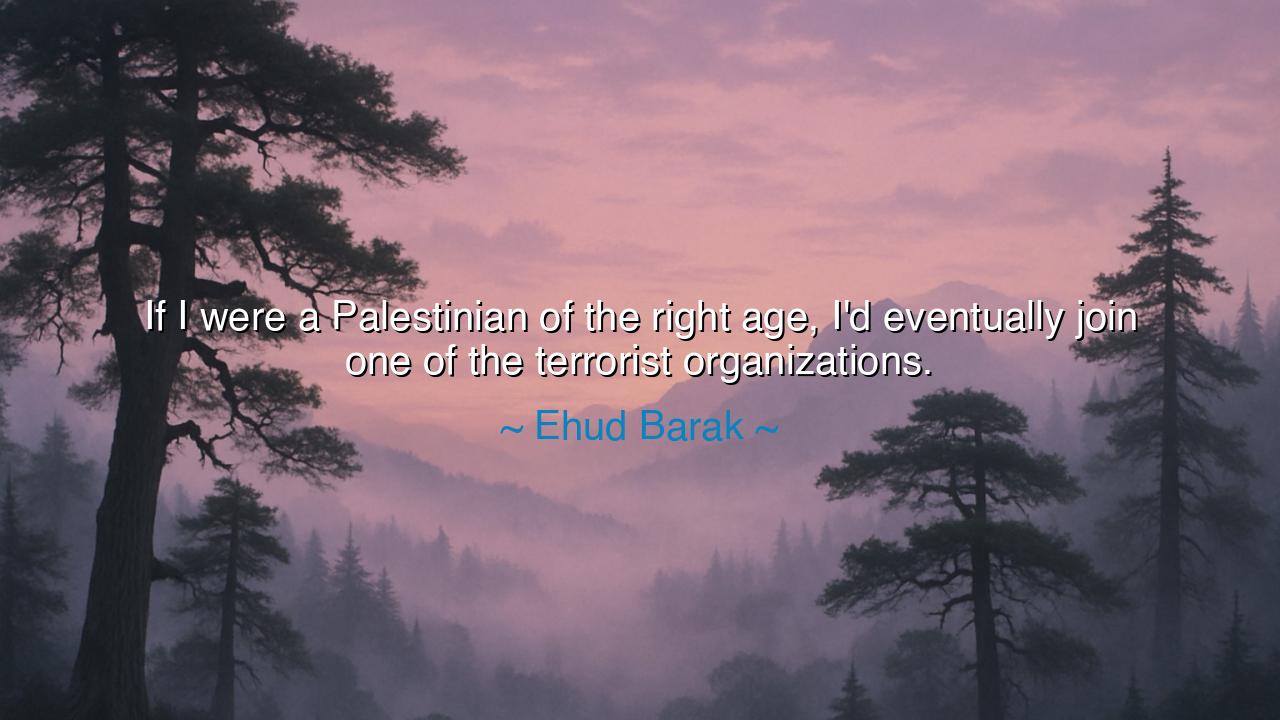
If I were a Palestinian of the right age, I'd eventually join one
If I were a Palestinian of the right age, I'd eventually join one of the terrorist organizations.






In the great tapestry of human conflict, where lines are drawn between nations, cultures, and peoples, there are moments when the weight of history presses down upon individuals, shaping their actions in ways that few can understand from the outside. The words of Ehud Barak, former Israeli Prime Minister and military leader, carry an unsettling truth: "If I were a Palestinian of the right age, I'd eventually join one of the terrorist organizations." These words are a powerful recognition of the deep grievance, suffering, and desperation that can lead an individual, trapped in a cycle of injustice and violence, to turn toward extreme measures.
What, then, does it mean when Barak acknowledges that he would join a terrorist organization under such circumstances? It is not a call for violence or an endorsement of terror, but a profound statement about the human condition in the face of oppression. It speaks to the power of context, the reality that, when individuals are pushed to the edges of survival, deprived of their dignity, and denied the right to live freely, they may seek out the only avenues of resistance available to them, even if those avenues are filled with destruction. Barak’s admission is a chilling reminder that the choice to resort to violence is not born out of inherent evil, but out of the crushing weight of circumstances that leave little room for hope.
In the ancient world, warriors were often born not of a desire for glory, but out of a need to protect family and land. The great Spartan warriors, for example, were trained from a young age not because they sought to be conquerors, but because they were raised in a society that demanded the protection of their people. They fought not for aggression, but out of a duty to their community. Similarly, in the story of the Maccabees, the Jewish warriors who resisted Greek oppression in the 2nd century BCE, their fight was born from the necessity to defend their faith and freedom. These figures, though seen as heroes in some stories and rebels in others, acted out of the need to resist oppression—a need that is often the driving force behind violence and rebellion throughout history.
Consider, too, the example of Nelson Mandela, who, as a young man, joined the African National Congress (ANC) and its armed wing, Umkhonto we Sizwe, not out of a thirst for violence, but as a means to resist the apartheid system that denied the basic rights of his people. Mandela, in his early years, came to the painful conclusion that peaceful means had failed to achieve justice. His fight, though deeply ideological, was also deeply personal, as he saw the suffering of his people and understood that the established systems would not bring about the necessary change without some form of resistance. Like Barak, Mandela understood the complexity of human actions—how the oppression of a people can lead them to choices they would not otherwise consider.
In a similar vein, we must reflect on the state of the Palestinian people in the context of Barak’s words. The Palestinian experience is one marked by years of displacement, loss, and exile. The inability to form a sovereign nation, the violence that has marked their lives, and the ongoing struggles for identity and freedom are not abstract concepts, but lived realities that have shaped generations. When a people are denied their basic rights and dignity, it is not surprising that some, in desperation, may turn to extreme measures to reclaim what has been lost. Barak’s words are not an endorsement of violence but an acknowledgment of the very real consequences of historical injustice and oppression.
The lesson that Barak’s words offer is not one that glorifies violence but one that calls for reflection and action. It is a lesson in understanding the root causes of conflict. The true question that arises from this statement is not whether we condemn the actions of those who resort to violence, but whether we are doing enough to address the grievances that give rise to such extreme measures. In the same way that Mandela and other leaders sought to resolve the causes of conflict through negotiation, dialogue, and justice, we too must seek to understand the suffering of others, to listen to their pain, and to work toward solutions that do not perpetuate the cycle of violence but break it.
Therefore, let us be mindful of the conditions that give rise to rebellion and violence. Barak’s words, while unsettling, serve as a challenge to our understanding of humanity and the choices that individuals make under duress. We must not only confront the symptoms of conflict but also the underlying causes—the inequalities, the oppression, and the lack of opportunity that shape lives. As individuals, as nations, and as members of a shared human community, it is our responsibility to strive for peace, not through force, but through understanding, through justice, and through the empowerment of all people to live with dignity. Only then can we hope to break the chains that bind us to the past and build a future where no person feels forced to make the desperate choices that violence often brings.






AAdministratorAdministrator
Welcome, honored guests. Please leave a comment, we will respond soon